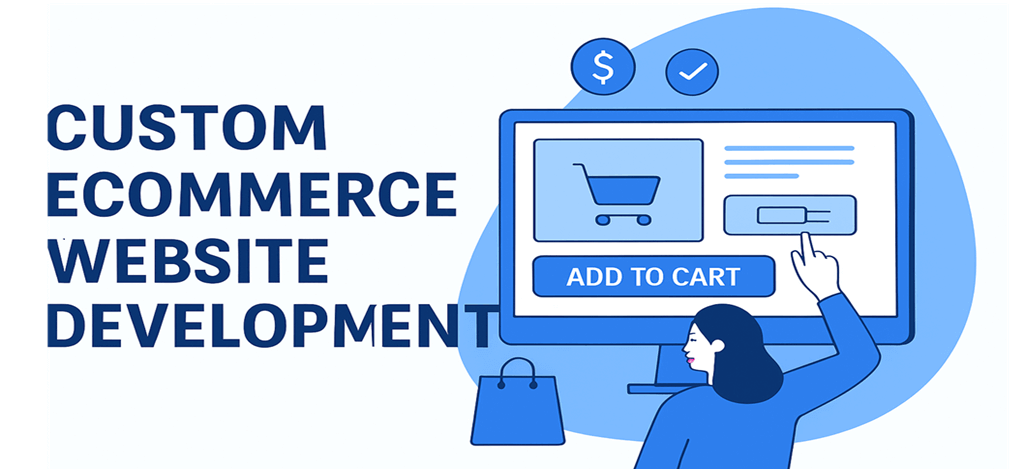In today’s digital world, running an online store is not just about having a website. It is about creating a shopping experience that customers enjoy and remember. A template-based eCommerce website may help you get started quickly, but will it really help you stand out in a market filled with millions of online stores?
With global eCommerce sales expected to reach $6.3 trillion in 2024, the competition is only getting tougher. If your online store looks and works like every other website, customers have little reason to choose you. This is where custom eCommerce website development comes in.
A customized online store is built specifically for your business needs. It gives you more control, better performance, and unique features that standard templates cannot provide. But the real question is: Is it worth the investment? Let’s explore in detail.
What is Custom eCommerce Website Development?
Custom eCommerce website development means building an online store tailored to your exact business needs instead of relying on pre-made templates.
Unlike ready-made platforms, a custom-built solution allows you to design and develop every aspect of your store. From personalized layouts to eCommerce platform customization, you can choose the features, integrations, and design that reflect your brand.
Some examples of customization include:
- AI-based product recommendations
- Multi-currency support
- Unique checkout processes
- Personalized online store design
- SEO-friendly structure
This approach ensures your store performs better, loads faster, and provides a unique eCommerce user experience.
Custom vs. Template eCommerce Website
When comparing custom vs. template eCommerce websites, the difference is clear.
- Template Websites: Quick setup, limited design, and restricted features. They look similar to thousands of other online stores.
- Custom Websites: Unique design, scalable features, stronger security, and full control over performance.
If you are serious about growth and want your brand to be recognized, a tailored eCommerce website development approach is the better option.
Benefits of Custom eCommerce Websites
Investing in custom development may seem expensive at first, but the long-term advantages make it worth it. Let’s break down the key benefits.
1. A True Reflection of Your Brand
Your website is your digital shopfront. A personalized online store design allows you to highlight your brand identity through unique colors, layouts, and visuals. Unlike generic templates, a custom website builds strong first impressions and long-lasting recognition.
2. Better User Experience
Research shows that 88% of people avoid websites that give them a poor shopping experience. With custom development, you can design smooth navigation, faster page loading, and personalized product suggestions. This improves engagement and encourages visitors to explore more.
3. Scalable Growth
As your business grows, your website should grow with it. A scalable eCommerce website makes it easy to add new features like AI recommendations, subscription models, or multi-language support. Templates often hit limits, but custom websites expand with your needs.
4. Faster Performance and SEO Advantage
Did you know a 1-second delay in page load can reduce conversions by 7%? Template websites often have unnecessary code that slows them down. Custom solutions are optimized for speed and performance, which also helps with better SEO rankings and organic traffic.
5. Unique Features for Your Needs
Every business is different. Whether you need special checkout steps, loyalty programs, or subscription-based models, eCommerce development solutions can add these features. Customization ensures your store is built for your unique requirements.
6. Stronger Security
With online fraud increasing, security is more important than ever. Templates are easy targets for hackers because they follow common structures. Custom development allows secure eCommerce solutions tailored to your business, protecting customer data and building trust.
Real Impact on Sales and Revenue
So, does a custom website actually increase sales? The short answer: Yes.
1. Higher Conversions
A custom store removes friction in the buying process. From smooth navigation to simplified checkout, every element is designed to improve the customer journey. This reduces abandoned carts and increases conversion rates.
2. Repeat Customers
Think of your favorite online store. You probably return because the shopping experience feels smooth and personal. Custom websites allow personalized offers, loyalty programs, and smart product recommendations. These features keep customers coming back.
3. Competitive Advantage
In a crowded market, being different matters. A custom eCommerce platform offers features and designs that make your brand stand out compared to competitors using ready-made solutions. This visibility brings long-term growth.
4. Better ROI Over Time
Yes, custom websites cost more initially. But over time, they deliver:
- Increased sales through improved user experience
- Lower bounce rates due to faster speed
- Higher customer retention from personalization and security
These factors ensure that your investment pays off and generates continuous revenue.
How to Build a Custom eCommerce Website: Step-by-Step
Step 1: Define Your Goals
Identify your main objectives. What products will you sell? Who is your target audience? What makes your brand different? Clear goals guide the development process.
Step 2: Research Your Audience
Use tools like Google Analytics and social media insights to understand your customers. Know their pain points and preferences to design a site that suits them.
Step 3: Choose the Right Technology
Select a suitable platform, programming language, and database. Many businesses choose frameworks like Magento, WooCommerce, or Shopify website development with customization options.
Step 4: Plan Your Website Structure
Organize product categories, simplify navigation, and create an easy, secure checkout process. A clear structure makes shopping smooth.
Step 5: Design a User-Friendly Interface
Invest in a clean, mobile-friendly design with quality visuals. Use consistent fonts, colors, and branding to make your site professional.
Step 6: Develop and Test
Build the website with a focus on speed, performance, and security. Test it on multiple devices to ensure everything works properly before launch.
Step 7: Add Essential Features
Key features include search filters, shopping cart, multiple payment methods, customer accounts, and analytics tools. You can also integrate CRM or email marketing tools for automation.
Step 8: Launch and Promote
Once live, promote your store using SEO, social media, Google Ads, and email marketing. Drive traffic to generate sales.
Step 9: Monitor and Improve
Track performance through analytics. If cart abandonment is high, simplify checkout. Continuously optimize based on customer behavior.
Final Thoughts: Is It Worth the Investment?
A custom eCommerce website is more than just a digital store. It is a long-term investment in your business growth. With unique design, stronger security, better performance, and scalable features, it gives you the tools to succeed in a competitive market.
While templates may save time and money at the start, they often limit growth and security. On the other hand, a tailored solution creates an online shopping experience that not only attracts new customers but also keeps them loyal.
In short: If you are serious about building a successful online business, custom eCommerce website development is worth every rupee you invest.







